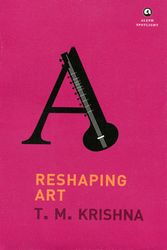At the Music Academy in Chennai, audiences see Carnatic vocalist T.M. Krishna as a rebel. Predominantly comprising Brahmins, the audiences tap their feet and keep time by rapping the thigh with the right hand. They praise performances or, at times, point out an apasvaram—a note gone wrong. They are used to a rigid format.
But, not for Krishna, whose music has broken the shackles. He has sung in front of and along with various communities, at venues that made political statements. The 2016 Ramon Magsaysay award had cited his commitment to art’s power “to heal India’s deep social divisions”.
In Reshaping Art, he extends the same treatment to art. Krishna’s teacher would often say music is not a necessity. To him, it was like a warning that they were obliged to their audiences. “We are entirely convinced that the higher powers are kind enough to support us, and hence we... never challenge or question them,” writes Krishna. “Even if we do, we take a lot of care to cushion the criticism. In that power structure, the audience, too, is seated high. Their pleasure is our driving force.”
It is a wake-up call for artists, who, he says, are more interested in satisfying the needs of others, than in creating art. And so, “we become suppliers of pleasure, not creative explorers. We have all but forgotten art itself,” he writes.
On the debate whether artists selected for honours want to be patronised by government dignitaries, Krishna believes it is the government’s need. “The reason that social and political organisations and individuals support art is because of its own immeasurable indispensability to society,” he says.
The book is not about painting or music or theatre. It is about the universe of art.
Reshaping Art
By T.M. Krishna
Published by Aleph Book Company
price Rs 399; Pages 112


